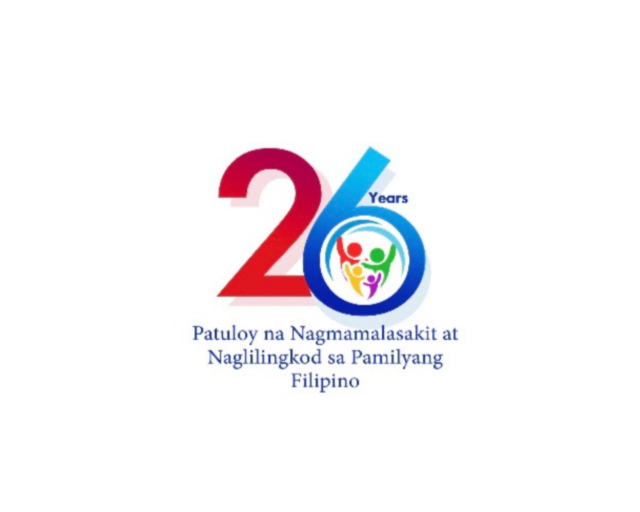It was in February 14, 1995 when Republic Act 7875 as amended, better known as the National Health Insurance Act of 1995, was signed into law. It was a landmark piece of legislation that envisioned universal population coverage under one social health insurance program.
Twenty-four years later in 2019, the Philippine’s journey towards Universal Health Care (UHC) reached a significant milestone when Republic Act 11223 or the Universal Health Care Act of 2019 was enacted and signed by President Rodrigo Roa Duterte. The UHC is a profound
and collective aspiration for the health of every Filipino wherein PhilHealth plays a vital role.
As PhilHealth marks its 26th year, it renews its vows to its members and continues to pursue reforms as mandated by RAs 7875 and 11223 for the benefit of all 110 million Filipinos. To aptly articulate such commitment, this year’s observance will redound around the theme “PhilHealth at 26: Patuloy na nagmamalasakit at naglilingkod sa pamilyang Filipino”.
PROVIDING FINANCIAL RISK PROTECTION TO FILIPINOS
As a financial intermediary and payor of healthcare services, it is paying for more than 8,000 medical cases and surgical procedures ranging from inpatient to outpatient care, and catastrophic interventions under its Z Benefit packages.
Its 2019 benefit claims expense amounted to P137 billion and for the first half of 2020 alone, it paid over P80 billion with the indigent sector as top availee at P22.5 billion or at 28 percent. PhilHeath is indeed one if not the largest payor of healthcare services in the country today, partnering with close to 2,000 strong hospitals and infirmaries, 6,500 other healthcare facilities, and 46,000 healthcare professionals to make such feats happen.
In response to the COVID-19 pandemic,
it introduced benefit packages to provide patients with adequate financial protection for the needed testing, isolation and treatment depending on the patient’s pneumonia. PhilHealth even shouldered the entire hospitalization expenses of health care workers afflicted by the virus as mandated under the two Bayanihan laws, Republic Act Nos. 11469 and 11494. As of February 10, 2021, PhilHealth reimbursed more than P6.5 billion worth of benefit claims related to COVID-19, over P4.4 billion of which was paid for RT-PCR Tests. More than P2 billion was paid for in-patient benefits while P25.6 million was spent for community isolation.
PhilHealth’s response to the pandemic did not go unnoticed not just locally by its partner hospitals and stakeholders but also globally. It was awarded with the Continuous Improvement Recognition Award by the ASEAN Social Security Association (ASSA) in December 2020, noting its “efforts in Covid-19 as catalyst for evolving the payment mechanism towards UHC’s progressive realization”.
On another note, WHO expert Helen Barroy in her article on public finance methods employed by countries during the COVID-19 outbreak (posted May 21, 2020) cited the Philippines, among other countries, that used “alternative spending modalities to accelerate the release of public funds to subnational levels and/or purchasing agencies and/or directly to the health service providers on the frontlines”, saying that “countries have tried different approaches to balance flexibility with control requirements” demonstrating “the effectiveness of these approaches to get resources to where they were most needed, including fast-track spending authorizations at the central level, accelerated procedures for fiscal transfers to sub-national levels, and advance payments to health service providers as a complement to retrospective reimbursements.”
It can be recalled that PhilHealth made available advanced financing amounting to P14.97 billion to its 711 healthcare providers to enable them to continuously provide health care to the people amidst the crisis. As of February 1, 2021, 94 percent or P14.09 of the said fund was already liquidated by its recipient hospitals.
PhilHealth does not stop from responding to the increasing healthcare needs of its members as the country battles the pandemic. The state insurer is currently studying the inclusion of benefit packages for RT-PCR test using saliva, an intermediate package for probable cases
of Covid-19, and coverage for those who will develop adverse reactions to the COVID-19 vaccine in a bid to increase public acceptance of the Government’s drive to vaccinate a substantial portion of the population.
STRENGTHENING PEOPLE’S TRUST
Despite the difficulties brought about by the pandemic as well as the intense public scrutiny, PhilHealth under its new President and CEO Atty. Dante A. Gierran has outlined his reform agenda PhilHealth 2.0 which will shift the “GEARs” towards UHC. GEARS, which stands for “Good Governance”, “Essential Benefits”,
“All Filipinos covered/registered”, “Responsive Health Care System”, and “Stronger Anti-Fraud Initiatives”, are all geared toward “… (improving) equity in accessing quality health care at various levels of care and efficiency in the allocation of (health) resources.”. Driving the PhilHealth GEARS is his Three-Point Action Plan that consists of Digital transformation; Anti-fraud measures; and Good governance and financial stability.
He intends to accomplish this through
the outsourcing of critical IT services to fully automate operations for efficient and effective management, monitoring and reporting systems. With his reputation as topnotch investigator and corruption buster, Gierran is serious in prosecuting erring facilities and professionals abusing the program through intensified investigations and the strengthening of its legal enforcement across all Regional Offices to help expedite and ensure success in prosecuting cases.
The new PhilHealth Management also believes that IT is key to boosting fraud detection. Hence, it is reviewing its electronic claims system and strengthening fraud scoring and red flagging of potentially fraudulent claims filed by unscrupulous providers. A centralized claims processing set-up is also being studied to avoid backlogs and further improve turnaround time.
More reforms are on its way. As PhilHealth welcomes a new era of reforms, it fully commits to take every challenge as the nation endeavors to progressively realize UHC for the generations of today and tomorrow.





